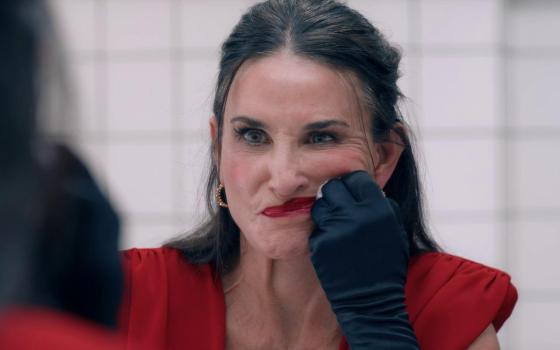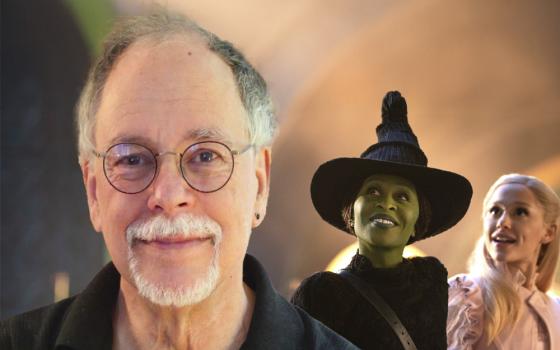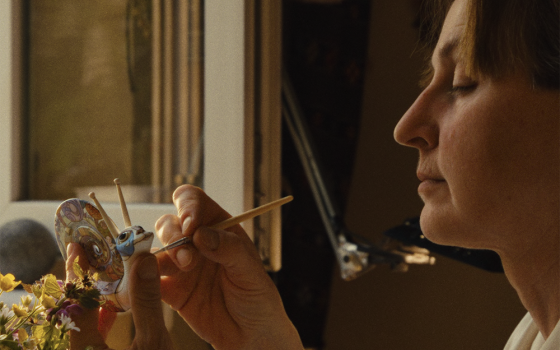
In the new film "Conclave," fictional cardinals (led by Ralph Fiennes, pictured) are tasked with selecting a new pope when the acting Holy Father suddenly dies. (Focus Features)
Laced with the poignancy of a homily and unfolding with the nail-biting intensity of a whodunit, the most miraculous achievement about Edward Berger's "Conclave" is how it bridges its pulpy thrills with its spiritual commentary.
Adapted from Robert Harris' 2016 novel of the same name, the film follows fictional cardinals tasked with selecting a new pope when the acting Holy Father suddenly dies. A movie about the electoral process may not seem rife with cinematic potential, but the creative rendering of the particulars of this ceremony, coupled with a decisive commitment to portraying the trappings of corruption and power, make the proceedings both entertaining and thought-provoking. In a time of deserved mistrust against religious institutions, "Conclave" makes a compelling and ecclesial call for a renewed spiritual stewardship characterized by humility, meekness and, curiously, doubt.
The opening of "Conclave" makes it evident that the path to such a hopeful vision is entered through a narrow gate. No sooner have the final words of blessing been prayed over the deceased Holy Father (Bruno Novelli) — rumored to have died of a heart attack — than the dean of the College of Cardinals, Lawrence (Ralph Fiennes), is required to initiate the process of choosing a successor. Within a few days' time, cardinals from all over the world fly into Rome and sequester themselves in the Sistine Chapel to begin the weighty and lengthy election. Though these men wear the same robes, they are a papacy divided against themselves.
Potential candidates span the political gamut: Bellini (Stanley Tucci) is the progressive contingent's champion, while Tedesco (Sergio Castellitto) represents the conservatives and, if elected, could undo work done by past popes. There's also the Canadian prelate, Tremblay (John Lithgow), who is more moderate, as well as Adeyemi (Lucian Msamati), who could be the first Nigerian pope — but his hardline stance against homosexuality complicates his odds. The true wild card is Cardinal Benitez (Carlos Diehz), the archbishop of Kabul, whose surprising last-minute arrival complicates the left-right divide.
Berger's rendering of the papacy is palpable, lived in. The actual process of how a new pope is selected remains a mystery, and while Berger and team take creative liberties to fill in the gaps of what they know, their depictions are rooted in respect and reverence. A love for the process and liturgy is evident in the way cinematographer Stéphane Fontaine's lens lingers on the intentionality with which the cardinals fold their hands in prayer or the precision with which they put on their robes. "Conclave" acknowledges the spiritual significance in the ceremony of these mundane moments, as important as prayers spoken and liturgies recited.
As the voting process begins and the candidates vie for the coveted two-thirds majority, the ugly side of ambition rears its head. It becomes clear that many who are gathered aren't beneath bribing their fellow brothers with a proverbial 30 shekels of silver to get votes, or resorting to blackmail to take candidates out of the running. Lawrence realizes that for his fellow brothers, it's hard to run the race and keep the faith when corruption and selfishness so easily entangle. Tedesco, Adeyemi and Tremblay are all too eager to drink from the cup of pontifical responsibility, but — as is often the way of men who hold a falsely high view of themselves — they know not what they seek.

Ralph Fiennes, left, is pictured as Cardinal Lawrence and Stanley Tucci as Cardinal Bellini in director Edward Berger's "Conclave." (Focus Features)
While the film never leaves the walls of the Vatican, the influence of the expectant public casts a weighty specter over the processes. Whoever becomes the pope will be responsible for stewarding one and a quarter billion souls; what happens in this election reverberates beyond the walls of the conclave. There's a haunting sense of amplification, that the vile tactics the cardinals resort to within will be perpetuated and amplified should that person become pope. This is especially poignant as we watch the nuns, led by Sister Agnes (Isabella Rossellini), toil, cook and clean for the cardinals, who don't give them a second thought. While the cardinals supposedly care about justice, they fail to center it in their own conduct.
Fiennes' Lawrence becomes the anchor through which the audience grounds themselves, and where Berger makes a convicting supplication to not demonize the doubts we may hold, especially for something as personal as our faith. Though he doesn't directly name it as such, there's a sense that Lawrence feels abandoned by God, and wrestles with how to discern God's voice when attempts at the church's praxis are carried out by flawed and petty men.
He reveals privately to Bellini that he had requested to leave the order, but the Holy Father denied his request and backhandedly told Lawrence that he made a better manager than shepherd. Those words reverberate throughout Lawrence's mind as he goes through the rhythms of the election process, a liturgical practice in and of itself that continually reminds him of the inadequacies of his spiritual leadership. Fundamentally, Lawrence wrestles with how the messiness of the world and the reality of sin complicates the ephemeral and intangible nature of Jesus' teachings; it is hard to submit to one another out of reverence for Christ if everyone is vying for the top leadership position.
Advertisement
Ultimately, it is Lawrence's own questions regarding prayer and trust in the institutional church that challenge us to consider the role of doubt in our faith. In a homily before the election process is set to begin, Lawrence says, "There is one sin which I have come to fear above all else … certainty." He goes on to describe how "certainty is the great enemy of unity … the deadly enemy of tolerance."
Certainty, Lawrence argues, eliminates the need for mystery — which eliminates the need for faith; there's a type of certainty that breeds a close-mindedness and pride that is corrosive to the soul. As faith is a living and active thing, he encourages his fellow clergy to listen to their doubts, for it is in those moments where they acknowledge they're not in control, that the spirit of God can surprise and do its greatest work.
"Conclave" believes that true faith makes its home not in inevitability, but in mystery. "I know what it means to exist between the world's certainties," Benitez confides in Lawrence after a particularly shocking revelation. In the same way, viewers too are invited to lie down in green pastures and beside still waters, lingering in the space between certainties and giving thanks for our doubts. For where our questions lie, God will be there also.







